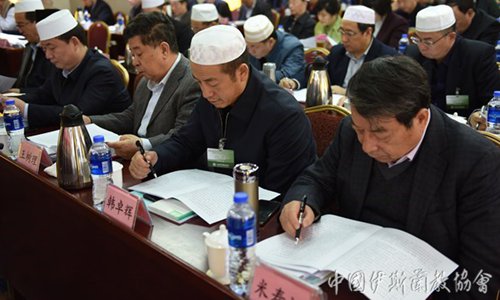
Representatives from local Islamic associations from eight provinces and regions, including Beijing, Shanghai, Hunan, Yunnan and Qinghai provinces, discuss a five-year (2018-2022) outline on the sinicization of Islam at a seminar held in Beijing on Saturday. Photo: Courtesy of the Chinese Islamic Association
China will soon release an outline on the sinicization of Islam, with Islamic communities urged to uphold the sinicization of their religion by improving their political stance and following the Party's leadership.
Representatives from local Islamic associations from eight provinces and regions, including Beijing, Shanghai, Hunan, Yunnan and Qinghai provinces, discussed a five-year (2018-22) outline on the sinicization of Islam at a seminar in Beijing on Saturday.
They agreed that the outline is the basic policy for Islamic sinicization for the next five years, according to a statement published on the China Islamic Association's website.
The outline also clarifies the primary work and measures for the sinicization of Islam.
Yang Faming, head of the China Islamic Association, said relevant measures should be implemented, including the holding of lectures and providing training on socialist core values, laws and traditional culture, as well as guiding Muslims through vivid stories with a positive spirit.
Jin Rubin, deputy chairman of the China Islamic Association, told the Global Times on Sunday that the outline's content will soon be released to the public after further revisions, and has already been distributed to local Islamic associations. The outline's draft was passed in December 2017.
This year is a critical year for implementing the outline, Ma Jin, a deputy head of 12th bureau of the United Front Work Department of Communist Party of China (CPC) Central Committee, told the seminar.
Ma stressed the importance of improving their political stance and following the Party's lead.
Gao Zhanfu, a vice dean of the Beijing-based China Islamic Institute, said on Sunday that sinicization of Islam has "matured" since the concept was brought forward in 2015 by President Xi Jinping.
The sinicization of Islam is not about changing the beliefs, habits or ideology of Islam but to make them compatible with socialist society, Gao told the Global Times.
He said books will be used in mosques in 2019 to help believers achieve a better understanding of Islam sinicization.
In September 2017, leaders from five religious communities - Buddhism, Taoism, Islam, Catholicism and Protestant - reached a consensus at a forum. They agreed that "the direction of religions is to integrate them with Chinese culture."
Although Protestant has already been sinicized in terms of sovereignty, the sinicization of theology and its cultural denotation has yet to be achieved, Fu Xianwei, chairman of the China Three-Self Patriotic Movement of the Protestant Churches, said at the forum.
In November of the same year, the Protestant community passed a draft five-year outline, which requires the communities to strengthen the theological foundation for the sinicization of Protestantism.
Catholic churches passed a draft version of a five-year outline to promote the sinicization of Catholicism in December 2017.

